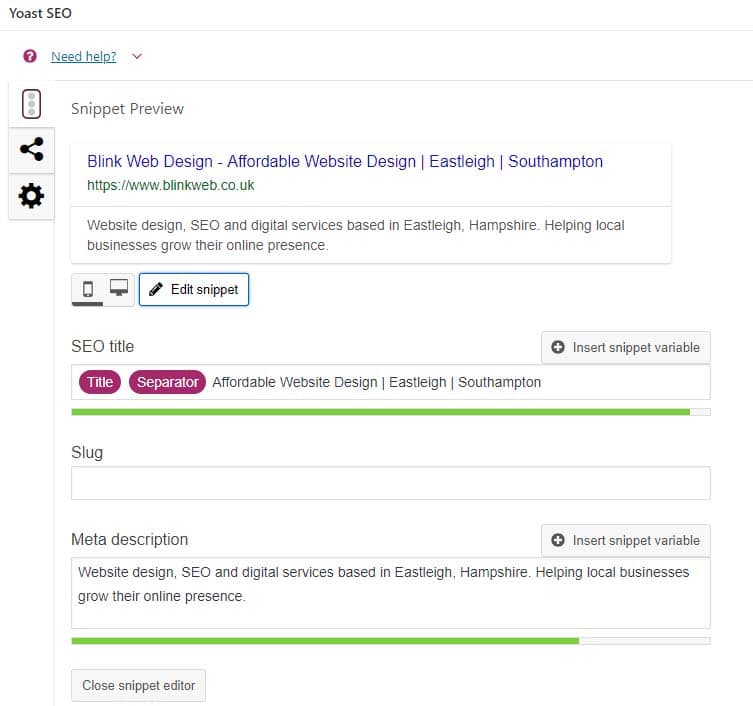Search Engine Optimisation or as we call it SEO changes on a month by month basis. Implementing good SEO practices not only increases website hits but also leads to higher sales and a more profitable business. We’ve put together a list of the top 5 tips you can start on today!
1. Implement SSL (HTTPS) on your site

HTTPS secures sites with an SSL encryption key which means traffic and data on the site is submitted securely. This is setup by installing an SSL certificate on your website. 84% of online users would abandon a purchase or submitting personal information if the website in insecure.
Since 2014 HTTPS has been included in Google’s ranking algorithm. Tests have shown that although Google won’t mark you down for not having HTTPS, they will rank you above others if you do.
Chrome now labels sites as ‘Not secure’ if no HTTPS is in place making it clear to the user they should avoid submitting information on that page.

Having a certificate installed displays a padlock showing the user that the website is secure and can be trusted.

How do I setup SSL/HTTPS?
You will need access to your web host to install a SSL certificate. You can have paid for certificates (We recommend NameCheap) or free certificates such as Let’s Encrypt which requires a little bit of technical know how.
If you have cPanel access to your web host, the install guide can be found here.
Many web hosts provide free SSL certificates automatically installed at no extra cost, check to see if yours does. All our hosting plans come with a free SSL certificate. Contact us if you wish to move your site to one of our plans.
2. Build your website for mobiles

Over 50% of web browsing is now made from mobile devices such as phones and tablets but 99% of websites are designed on a standard computer. Google is moving to Mobile-first indexing. What this essentially means is that if your website is not mobile friendly, it will rank lower than those that are. Test your websites mobile compatibility here.
If you use WordPress, Elementor is a great page builder that allows you to switch the design view from desktop to mobile. This ensures that when you’re building a page, you can ensure it looks as expected for mobile devices before going live.
3. Improve website load speed

How quickly your site loads is one of the signals used by Google to rank pages. A slow site will rank lower than a faster site. Test your website speed with Google’s own Page Speed Insights
Slowness can be caused by many things, large images, database issues, video rendering or a slow web host.
Ensure all images and optimised to the correct size. A quick an easy tool for this is Image Optimizer also try and avoid video backgrounds on your homepage. These may look pretty but are a heavy burden when loading the page.
The main cause of website slowness is usually a slow web host. Most cheap hosting providers cram hundreds of websites onto one server. Type your domain in here and you may find you share the same server as hundreds of other websites. All sites on the same server share the same resources which can result in below par performance, not to mention a big security risk. The good news is that anyone can move host, if your site is slow then simply take your business elsewhere.
We offer a free website migration on our hosting plans. You’ll be back up and running on a faster server within a few hours.
4. Optimise page titles

Page titles are a major factor in your Google ranking position. It tells Google and your customers what the page is about and builds that important first impression of your business. Your page title is displayed in Google, web browsers and social networks so it’s essential to ensure your title clearly reflects your service and brand name.
We’ll use our business as an example. We do not want our home page title to simple be
‘Blink Web –Home Page’
This does not clearly state what the business is and will result in less clicks. Instead, our page title is configured as
‘Blink Web Design – Affordable Website Design – Eastleigh – Southampton’
This gives a clear indication of our company name, what we do and our location. The page title also helps us appear in search results such as ‘Website design, Eastleigh’
How can I edit page titles?
For WordPress
We recommend the Yoast SEO plugin. After this plugin has been installed, the plugin will appear at the bottom of the page you’re editing and enables you to add in the page title and a description of the page.

For Wix
- Click on Menu’s & Pages on the left side of the editor
- Click the relevant page then click Show more
- Click SEO & Social
- Enter your chosen page title under ‘What’s the page’s title on search engine?
- Click Done then Publish
For Squarespace
- Hover your mouse over the title text on your page and click Edit
- Type your site title in the Site Title box
- Click Save
5. Quality Content

This is probably the biggest of them all. Google revealed themselves that content is among the top 3 ranking factors. Long quality content targeted to your relevant audience is key to climb up Googles ranking process.
Long gone are the days where you could flood 50 key words into a short blog post. Instead you’ll need to research and develop content which has all the information relevant to your niche target audience.
While having keywords are still important, the emphasis now is on quality informative content and relevance. With each blog post ensure you have a title and an opening paragraph before delving into the key information. Ensure the titles have a heading tag too.
Once you’ve finished drafting the content, re visit and try to fit in key words where appropriate. Try not to overdo it as this can actually have a negative effect on ranking.
Research has shown that content over 1000 words tend to rank higher but only if it’s thorough. Try not to let the content lose focus
Only you will know your audience. Make a note of common questions and translate this into a informative blog post.



